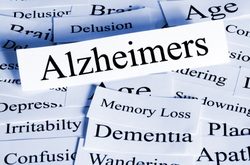|
10/3/2012 Memory Cafes & Overnight Respite Care I've just been reading about these two concepts for Alzheimer's care, which frankly could completely change the face of caregiving for families dealing with this difficult disease. Given that one of the biggest problems for family caregivers caring for their loved one at home is isolation/depression, the chance to be with a group of other caregivers (and care receivers) in an enjoyable social setting provided by the Memory Cafe is a perfect boost to mental and emotional health. Even respite care, though very necessary, doesn't provide the same kind of supportive, warm, interactive environment in which to simply exchange conversation, ideas and enjoy the company of others who completely understand the challenges of the Alzheimer's journey. It benefits both the caregiver and receiver to have this type of socially stimulating environment. It is not a "support group" for caregivers, since the aim is not to provide education, problem solving, or information, but rather just to have fun! The concept for Memory Cafes is really beginning to catch on in England, and is now being actively advocated here in the US as well. The focus is on positive reinforcement among peers, laughter, food and simple pleasure in the company of others who are going through the same journey -- without any stigma attached. After all, other caregivers will be much more understanding of behaviors that might cause embarassment in a public setting. According to John T. McFadden, in an article written for the Alzheimer's Reading Room: A Reminder: Why We Need Memory Cafes, "Memory Cafes are, first and foremost, a setting in which persons with memory loss can share fun and laughter with their care partners and friends in a setting free from awkwardness and stigma." Speaking as a former caregiver, I think this is a truly wonderful idea, one whose time has come! Mr. McFadden has written a newly released book to champion the cause, titled, Aging Together: Dementia, Friendship, and Flourishing Communities. He and his wife are planning to visit existing Memory Cafes in England in order to refine a model for use in America. This is a concept we should most definitely support. It just makes sense to tap this important resource we have in each other -- our sense of friendship and community, which can be an invaluable help to those on the front lines of Alzheimer's. The second concept, which is new to me, but has been practiced at the Hebrew Home at Riverdale in New York for the past 10 years, is overnight care for dementia patients to allow caregivers a good night's rest at home. This innovative concept makes 24-hour use of the nursing home facility, to provide day care from 8:30am to 4 pm and overnight care from 7 pm to 7 am. The program creates a sort of party atmosphere for the participants, with music, marimbas, and dancing as well as singalongs, crafts, and therapy sessions that last till dawn. There is also provision made for those whose Alzheimer's may be more advanced, which includes soothing sounds, aromatherapy, massage and touch therapy. If you would like to read more about this, here's a link to an Associated Press article appearing in the Wall Street Journal, updated October 1, 2012, titled: Overnight dementia 'camp' allows caregivers rest. Because so many Alzheimer's patients are very wakeful and sometimes agitated at night (called Sundowning), it creates major problems for families when their sleep is disrupted night after night by this behavior. Again, from a personal experience perspective, this was the single most insurmountable problem for my family -- sleep deprivation for months on end. It errodes a person's health, sanity, and makes the demands of caregiving impossible to continue. It is a major complaint of Alzheimer's caregivers and one of the main reasons for institutionalizing their loved one. It doesn't have to be if there are more programs for overnight respite care developed around the country. It really makes perfect sense to use facilities around the clock (with different shifts of staff, obviously), so that families can rest and resume their care duties after a good night's sleep. I would love to hear your feedback on these two concepts and any personal stories you'd like to share about how your family is affected by these challenges of caregiving. Feel free to comment below. 4/28/2012 To Sleep, perchance to dream...Today's topic is sleep. Or, in the case of most caregivers, lack thereof. This was one of the very biggest issues for me, in trying to manage as a caregiver -- there was generally never enough sleep, and what there was tended to be poor quality, oft-interrupted, causing me to generally awaken feeling tired. Not a good way to start the day! I found that I slept very lightly, in order to hear when I was needed if my mother awakened and got out of bed, which happened quite often. I imagine other caregivers struggle with this same problem. One trick I learned was to place her walker right up next to the bed so that she couldn't get up without using it. As soon as I heard it's particular noise, I was immediately alert and up. There are a few tried and true remedies for sleep -- I think I've tried them all. Well, that's not true, actually. I never used any prescription sleep aid because I was afraid it would knock me out to the point I wouldn't awaken if I needed to do so, and because they are incredibly addictive. Neither of those seemed like a good idea. So, here are the old remedies, time honored and tested through the centuries. I figure the reason they are still around is that they work. Note: You can use these on yourself, and, in most cases, they are safe for your loved one as well, but I'm not giving medical advice -- you should, of course, check with your loved one's doctor to make sure there is nothing to contraindicate them. 1) Warm milk at bedtime -- this one really does work. You can add a drop of vanilla extract for flavoring, or a little bit of honey or cinnamon. Just a small amount can soothe and adds L-tryptophan which makes you sleepy. 2) Lavender aromatherapy -- this is a nice, easy bedtime ritual that can aid sleep. A drop of pure lavender essential oil on a cotton ball tucked into your pillow case, or a spritz of lavender mist on your pillow can bring on sweet dreams. Orange oil also works for this purpose. 3) Melatonin -- There are a number of products on the market with melatonin. The one I prefer is Schiff's Melatonin Ultra which provides 3 mg of melatonin, theanine, GABA vitamin B6 & calcium. I really like that it doesn't leave me with a sleep "hangover", and I still am sleeping lightly enough to wake if needed. That's a real plus for a caregiver. Again, check with your doctor (or your loved one's) to make sure this won't interfere with other medications. 4) Chamomile tea - There are many different combinations or blends of chamomile tea available from your grocery store or health food store. My fave is Sleepy Time. But, I think they all work pretty well. 5) If noise is a problem, and because you need to be available you can't wear earplugs, try a white noise generator, or, even better, a HEPA filter air purifier. The noise generator makes a whooshing sound, sort of like ocean waves -- some have multiple selections for the sounds. The HEPA filter -- I recommend Austin Air if you are looking for the best (I've had mine for 15 years, running 24/7 and never a problem)-- has a dual function in that it creates some white noise while at the same time giving you clean, pure air. If you want more information about good sleep habits, you can read Deepak Chopra's book, Restful Sleep, for a whole host of ideas to make sleep more rejuvenating and easier to experience. I found many of his ideas helpful and still practice some of them. There you have my helpful hints for a better night's sleep, while still being there for your loved one -- sweet dreams! |
About Karen
Karen is a compassionate, enthusiastic student of life, who cared for her mother for 17 years. She brings her insights, compassion, experience and desire to share knowledge and healing to this ongoing conversation with others on the caregiving path. If you are caring for a parent, spouse, friend or other loved one this site offers sanity-saving tips, open-hearted self-care ideas, and an open forum for discussion, connection and sharing resources for the journey. Archives
October 2021
CategoriesAll Acceptance Aging Together Alan Cohen Alive Inside Movie Alzheimer's Alzheimer's Prevention A Mind Of Your Own Anxiety Aromatherapy Audio Therapy For PTSD Austin Air Hepa Filter Autism Back Care Video Beginner's Mind Being Present Blessing For Caregivers Books Brain Insulin Butterfly Story Calm Calm.com App Care For Veterans Caregiver Advocate Caregiver Coalition Caregiver Comfort Kit Caregiver Guilt Caregiver Retreat Caregiver's Serenity Prayer Caregiver Stress Caregiver Support Care Giving Caregiving Vulnerability Care In Hospital Caterpillar Into Butterflies Chamomile Tea Cindy Laverty Comedian Computers & Exercise Crisis Dan Cohen Deepak Chopra Delirium Depression Diabetes Disaster Preparedness Distractions Dr. Dharma Singh Khalsa Dr. Oliver Sacks Eden Alternative Eldershire Elizabeth Dole Foundation Emergency Planning Emergency Preparation Emerson End Of Caregiving Enough Already Escapism Essential Oils Food Safety Forgiveness Funny Stories Gaiam.com Gail Sheehy Gift Of Alzheimer Gift Of Healing Presence GMO Food Green House Project Gregory Fricchione Md Grief Guilt Happy Light Healing Holding Hands Home As Sanctuary Hope Hospital Caregiving Hospital Stay Humor Inspirational Reading Ipods For Nursing Homes Isolation Jacksonville James E. Miller John Denver Johns Hopkins Study John T. McFadden Jon Kabat-Zinn Kelly Brogan Kirtan Kriya Meditation Lao Tzu Laugh Laughter Lavender Loneliness Loss Of Purpose Love Love In The Nursing Home Maya Angelou Mayo Clinic Mayo Clinic Alzheimer's Blog MD Meditation Meditation Garden Melatonin Memory Memory Cafe Military Caregiver Mindfulness Meditation Mr. Bean Music Music & Alzheimer Music And Memory Neurological Research Noise Pollution Operation Family Caregiver Opportunity Overnight Respite Care Pandemic Passages In Caregiving Patience Paul Coelho Peace Post-traumatic Stress Disorder Power Of Love Prayer PTSD Quality Of Sleep Radical Contentment Relaxation Releasing Problems Renewal Research Respite Rewind Rodney Yee Rosalynn Carter Rosalynn Carter Institute For Caregiving Rowan Atkinson Sanctuary Sanity Self Care Serenity Silence Sleep Slowing Time Solutions Soothing Music Stress Stress Relief Sun Sunshine Support For Caregivers Tai Chi Thanksgiving The Care Company The Kiss Time Traumatic Brain Injury Travel With Alzheimer's Person Treat VA Caregivers Valentine's Day Verilux Veteran Farms Veterans Veteran Suicide Vitamin D Wayne W. Dyer Wellness Wendell Berry White Noise William H. Thomas Worry Yoga Yoga Video |

